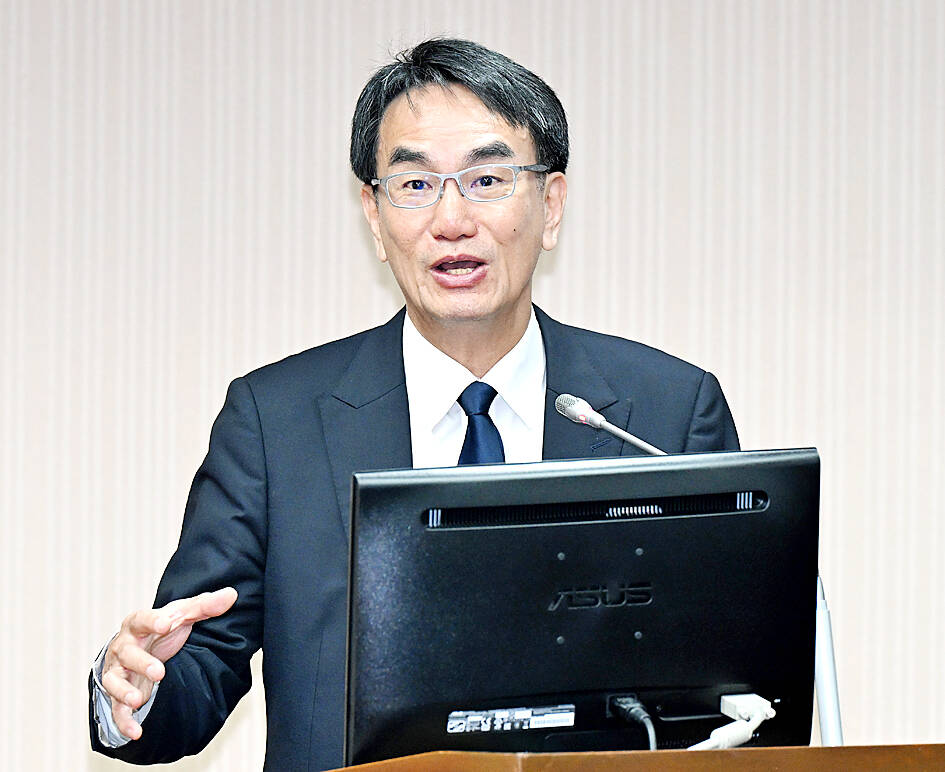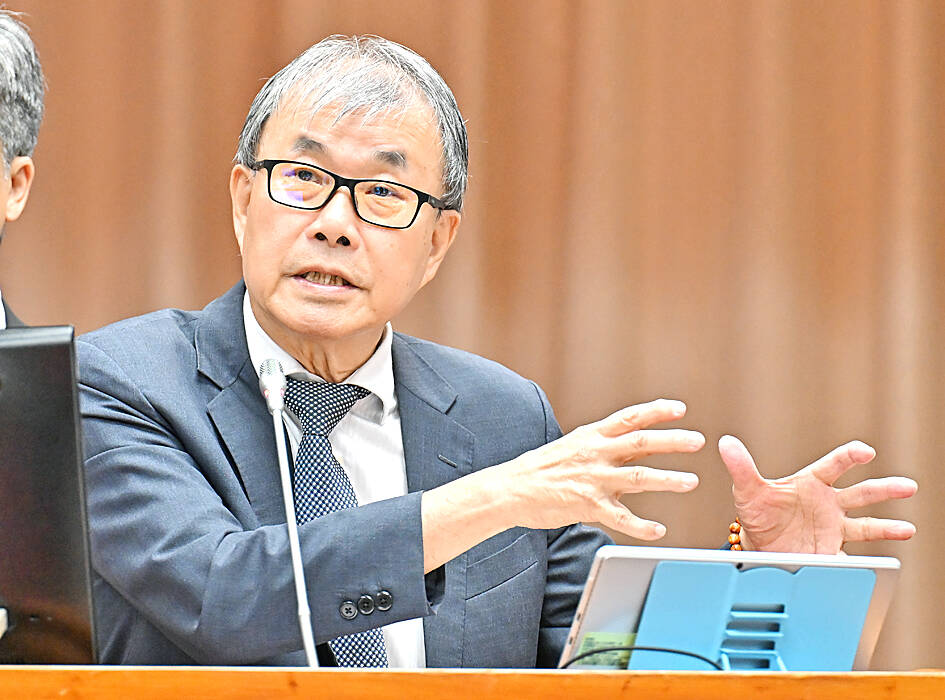The government is considering restricting access to TikTok for elementary and junior-high-school students by blocking it on campus Wi-Fi networks, the Ministry of Digital Affairs said yesterday.
Minister of Digital Affairs Lin Yi-jing (林宜敬) briefed lawmakers at a meeting of the legislature’s Transportation Committee for the first time since taking office last month.
He was asked whether the government would impose a comprehensive TikTok ban in grade schools, with some legislators saying that content on the platform could harm the physical and mental health of young students.

Photo: Liao Chen-hui, Taipei Times
There are three major concerns regarding the use of TikTok: where the platform stores user data, whether the company is controlled by Chinese investors and the harm its content might pose for young students, Lin said.
The US government is trying to address the first two issues with TikTok, he said.
“We are working closely with the Ministry of Education to address the issue about protecting children from potential harm associated with content on TikTok,” he said. “Currently, TikTok does not permit children aged 12 or under to create an account, while users aged 13 to 15 are granted only limited access to the platform.”

Photo: Chen Chih-chu, Taipei Times
“We are leaning toward limiting student access to TikTok by blocking it on school Wi-Fi networks,” he said. “We would discuss this matter with the Ministry of Education and the Ministry of Health and Welfare. Hopefully, we would have some ideas how the measure should proceed by the end of this year.”
Schools would not be asked to check students’ mobile phones, Lin said, adding that whether TikTok should be completely banned requires a public consensus, as it is a freedom of speech issue.
Chinese Nationalist Party (KMT) Legislator Hung Meng-kai (洪孟楷) said that the government should compile a list of applications that might be detrimental to children, rather than just TikTok.
TikTok and Douyin (抖音) are sister apps owned by Chinese Internet company ByteDance (字節跳動), with TikTok serving international markets and Douyin operating exclusively in China.
Separately, the issue of whether Douyin should be banned on school campuses came under scrutiny at a meeting of the legislature’s Education and Culture Committee.
Democratic Progressive Party Legislator Chen Hsiu-pao (陳秀寶) said that deaths and injuries among young people taking on dangerous and deadly challenges on Douyin have been reported worldwide.
Despite the risks, student groups say that rather than banning Douyin, the government should teach literacy of potentially harmful content, Chen said.
KMT Legislator Ko Ju-chun (葛如鈞) said that Facebook and Instagram have more fraud and disinformation than Douyin and Xiahongshu (小紅書, or RedNote), adding that banning students from accessing social media would trigger a backlash and hamper innovation.
Minister of Education Cheng Ying-yao (鄭英耀) said that the Executive Yuan’s Guidelines for Government Agencies on the Restricted Use of Products that Threaten National Cybersecurity (各機關對危害國家資通安全產品限制使用原則) stipulate that elementary and junior high schools must not have Chinese-made hardware or software, and content from Douyin and platforms that have little relevance to learning have been eliminated from the nation’s academic network.
Aside from setting clear regulations on student access to social media on campuses, Cheng said that the ministry would ensure students are properly educated to discern whether online information is accurate and genuine.

A magnitude 5.6 earthquake struck off the coast of Yilan County at 12:37pm today, with clear shaking felt across much of northern Taiwan. There were no immediate reports of damage. The epicenter of the quake was 16.9km east-southeast of Yilan County Hall offshore at a depth of 66.8km, Central Weather Administration (CWA) data showed. The maximum intensity registered at a 4 in Yilan County’s Nanao Township (南澳) on Taiwan’s seven-tier scale. Other parts of Yilan, as well as certain areas of Hualien County, Taipei, New Taipei City, Taoyuan, Hsinchu County, Taichung and Miaoli County, recorded intensities of 3. Residents of Yilan County and Taipei received

Taiwan has secured another breakthrough in fruit exports, with jujubes, dragon fruit and lychees approved for shipment to the EU, the Ministry of Agriculture said yesterday. The Animal and Plant Health Inspection Agency on Thursday received formal notification of the approval from the EU, the ministry said, adding that the decision was expected to expand Taiwanese fruit producers’ access to high-end European markets. Taiwan exported 126 tonnes of lychees last year, valued at US$1.48 million, with Japan accounting for 102 tonnes. Other export destinations included New Zealand, Hong Kong, the US and Australia, ministry data showed. Jujube exports totaled 103 tonnes, valued at

TRUST: The KMT said it respected the US’ timing and considerations, and hoped it would continue to honor its commitments to helping Taiwan bolster its defenses and deterrence US President Donald Trump is delaying a multibillion-dollar arms sale to Taiwan to ensure his visit to Beijing is successful, a New York Times report said. The weapons sales package has stalled in the US Department of State, the report said, citing US officials it did not identify. The White House has told agencies not to push forward ahead of Trump’s meeting with Chinese President Xi Jinping (習近平), it said. The two last month held a phone call to discuss trade and geopolitical flashpoints ahead of the summit. Xi raised the Taiwan issue and urged the US to handle arms sales to

BIG SPENDERS: Foreign investors bought the most Taiwan equities since 2005, signaling confidence that an AI boom would continue to benefit chipmakers Taiwan Semiconductor Manufacturing Co’s (TSMC, 台積電) market capitalization swelled to US$2 trillion for the first time following a 4.25 percent rally in its American depositary receipts (ADR) overnight, putting the world’s biggest contract chipmaker sixth on the list of the world’s biggest companies by market capitalization, just behind Amazon.com Inc. The site CompaniesMarketcap.com ranked TSMC ahead of Saudi Aramco and Meta Platforms Inc. The Taiwanese company’s ADRs on Tuesday surged to US$385.75 on the New York Stock Exchange, as strong demand for artificial intelligence (AI) applications led to chip supply constraints and boost revenue growth to record-breaking levels. Each TSMC ADR represents